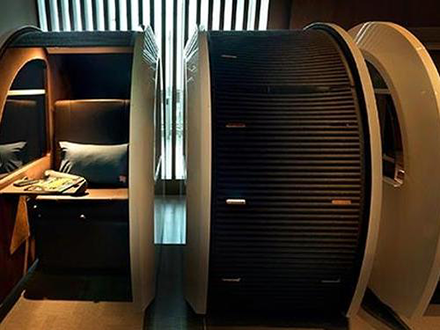Jet lag, a frequent companion of long-haul flights, is often linked with international travel. However, it can manifest on any flight heading east or west across three or more time zones. The resulting sleep disruptions pose a challenge, unsettling your body's internal clock and creating a misalignment with the day-night cycle at your destination. Understanding these nuances becomes crucial for avoiding jet lag, allowing you to harmonise with the local time seamlessly.
Fortunately, we have collected some top tips to help you avoid jet lag and make the most of your journey from the moment you touch down. In this guide, we'll explore some tried-and-true methods to help you conquer jet lag and kickstart your adventure on a revitalised note.
1. Choose Overnight Flights:
When planning your itinerary, opt for flights that align with your destination's local time. Overnight flights can allow you to sleep during the natural night hours at your destination and wake up closer to the local time zone. We recommend you bring a neck pillow, sleeping mask and some earplugs to help you drift off.
2. Refresh During Layovers:
If your itinerary includes a layover, take advantage of available amenities, such as showers in Priority Pass lounges. A quick shower can work wonders in revitalising your body and mind, helping you feel more awake and alert for the next leg of your journey. Additionally, some lounges offer comfortable sleeping areas where you can catch up on rest between flights, ensuring you arrive at your final destination feeling more refreshed. |
 |
3. Stay Fuelled:
Plane cabins are notorious for low humidity levels, which can lead to dehydration. Counteract this by drinking plenty of water before, during, and after your flight. Avoid excessive caffeine and alcohol, as they can contribute to dehydration and disrupt your sleep patterns. Refresh and refuel ahead of your flight with a range of complimentary snacks and drinks in one of our lounges.
4. Gradual Time Adjustment:
In the days leading up to your departure, gradually adjust your sleep and mealtimes to align with the time zone of your destination. This pre-emptive strategy can ease your body into the new schedule, making the transition less abrupt. This doesn’t have to be a drastic transition, such as eating your breakfast for dinner. Instead, if you usually eat your dinner at 8pm, consider pushing this forward to 6pm or back to 10pm to help your body to adjust to the new time zone.5. Short Naps for Quick Recharge:
Taking a short nap can significantly contribute to minimising the effects of jet lag and enhancing your overall travel experience. While it's tempting to take a long nap upon arrival, this can exacerbate jet lag. Instead, opt for short power naps to recharge without disrupting your sleep schedule. Aim for 20-30 minutes to boost alertness without entering deep sleep.
6. Maximise Natural Light Exposure:
Natural light is a powerful regulator of the circadian rhythm. Spend time outdoors in the sunlight upon arrival to help reset your internal clock. Conversely, dim the lights and limit exposure to screens in the evening to signal to your body that it's time to wind down. This might seem obvious, but it can make all the difference.
7. Melatonin Supplements:
Consider using melatonin supplements to help regulate your sleep-wake cycle. Start taking melatonin a few days before your departure and continue for a few days after arrival to aid in adjusting to the new time zone. There are many over the counter sleeping-pills you can purchase but we always do recommend seeking advice from your doctor as well.8. Avoid Heavy Meals:
Large, heavy meals can disrupt your sleep and digestion. Whilst we always want to get a taste for the local cuisine, we recommend you opt for light, easily digestible meals during your journey and in the first few days at your destination to minimise the impact on your body's internal clock.
9. Stay Active:
Engage in light exercise upon arrival to boost your energy levels and combat fatigue. A leisurely swim, gentle stretching, or some light yoga can help alleviate stiffness from the flight and promote a sense of alertness. A great way to stay active is to take a walk around the local area, this not only helps energy levels but also gives an opportunity to explore new surroundings and become familiar with your new destination.
Jet lag may be an unavoidable part of long-distance travel, but with careful planning and strategic choices, its impact can be minimised. By incorporating these tips into your pre-flight and post-arrival routine, you can bid farewell to jet lag and embrace your destination with energy and enthusiasm. Bon voyage and happy travels!

